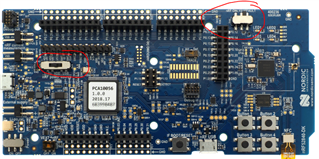Hi!
A strange problem we encountered is a different behavior of our boards before and after cutting the SB40 bridge and place a jumper on P22.
First part which works as expected, we use the Nordic usbd_cdc example:
1. Flash a program which uses NRF USB port J3 to debug by receiving messages over USB CDC. We used this one from the examples folder provided: nRF5_SDK_15.3.0_59ac345\examples\peripheral\usbd_cdc_acm. Program works well and messages are received and displayed without problems via putty.
2. Following Preparing the development kit board for current measurement we cut the SB40 bridge, place the switches in the appropriate position, and performed a current measurement.
3. We then wanted to restore normal kit function to the DK, so we placed a jumper on P22, as instructed in the link in step 2.
The J3 USB connection identifies properly under the device manager, and can be used without issues.
Second part which does not work as expected, we use our own code:
We follow the same steps detailed above, only this time we use our own code which uses the usb connection as a debug the same way usbd_cdc example uses it.
So we:
1. Flash our own software and use the USB as debug. USB identifies and works well.
2. We cut the SB40 bridge and place a jumper on P22 to restore normal kit function to the DK.
3. With the exact same software which worked in step 1, the SB40 cut and the P22 jumper in place, the J3 USB connection now does not identify under the device manager and can not be used anymore.
This seems to be a software+hardware problem, so we are confused as to the possible cause. I was hoping someone could point me in the right direction without having to include my code in the question, so this can be helpful to others. If needed I will post a private questions to the Nordic team.
Thanks!


